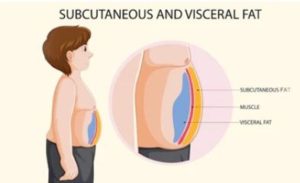
Visceral fat, often referred to as “belly fat,” is not just about aesthetics. It’s a type of fat that surrounds your internal organs and can contribute to various health risks.
Understanding what visceral fat is and adopting strategies to reduce it is essential for maintaining overall well-being.
What Is Visceral Fat
Visceral fat is different from the subcutaneous fat found just beneath the skin. It’s located deep within the abdominal cavity, surrounding vital organs like the liver, pancreas, and intestines. While some level of visceral fat is necessary for cushioning and protecting these organs, excess visceral fat is associated with increased health risks.
Health Risks Associated with Excess Visceral Fat
High levels of visceral fat are linked to a higher risk of several health issues, which includes type 2 diabetes, heart disease, stroke, and certain types of cancer.
Unlike subcutaneous fat, visceral fat is metabolically active and can release harmful substances into the bloodstream, contributing to inflammation and insulin resistance.
Effective Strategies for Reducing Visceral Fat
“Focusing on whole-body exercises that will help you burn more calories throughout the day is the greatest strategy to eliminate tummy fat. These include walking, biking, swimming, and strength-training exercises, as well as adhering to a calorie deficit eating plan that includes at least 0.8g to 2.0g of protein per day”, said Nawaz Shaikh, Wellness Expert & Founder of FITX Transformation. Following dietary changes can be incorporated to reduce visceral fat:
Focus on a diet rich in fruits, vegetables, whole grains, lean proteins, and healthy fats.
- Control portion sizes
- Be mindful of portion sizes to avoid overeating, even when consuming nutritious foods.
- Limit sugary foods and beverages
- Sugary items contribute to fat accumulation, especially around the abdomen.
Cardiovascular exercise
Engage in activities like brisk walking, jogging, cycling, or swimming to burn calories and improve overall fitness.
Strength training
Incorporate resistance exercises to build muscle mass, which can help boost metabolism and reduce visceral fat.
Learn to manage stress
Chronic stress can lead to increased abdominal fat. Practice relaxation techniques such as meditation, yoga, or deep breathing to manage stress levels.
Quality Sleep
Aim for 7-9 hours of quality sleep each night. Poor sleep patterns can disrupt hormonal balance, leading to weight gain, including visceral fat.
Hydration
Drinking enough water helps control appetite and can aid in weight management.
Avoid Crash Diets
Extreme diets may result in quick weight loss, but they often lead to muscle loss and a rebound in fat gain, including visceral fat.
Reducing visceral fat goes beyond cosmetic goals-it’s about prioritising your health and reducing the risk of serious medical conditions.
By adopting a combination of healthy eating, regular exercise, stress management, adequate sleep, and staying hydrated, you can take meaningful steps toward reducing visceral fat and improving your overall well-being. Remember, consistency and patience are key on this journey to a healthier you.




 Driving Naari Programme launched in Chandigarh
Driving Naari Programme launched in Chandigarh






























